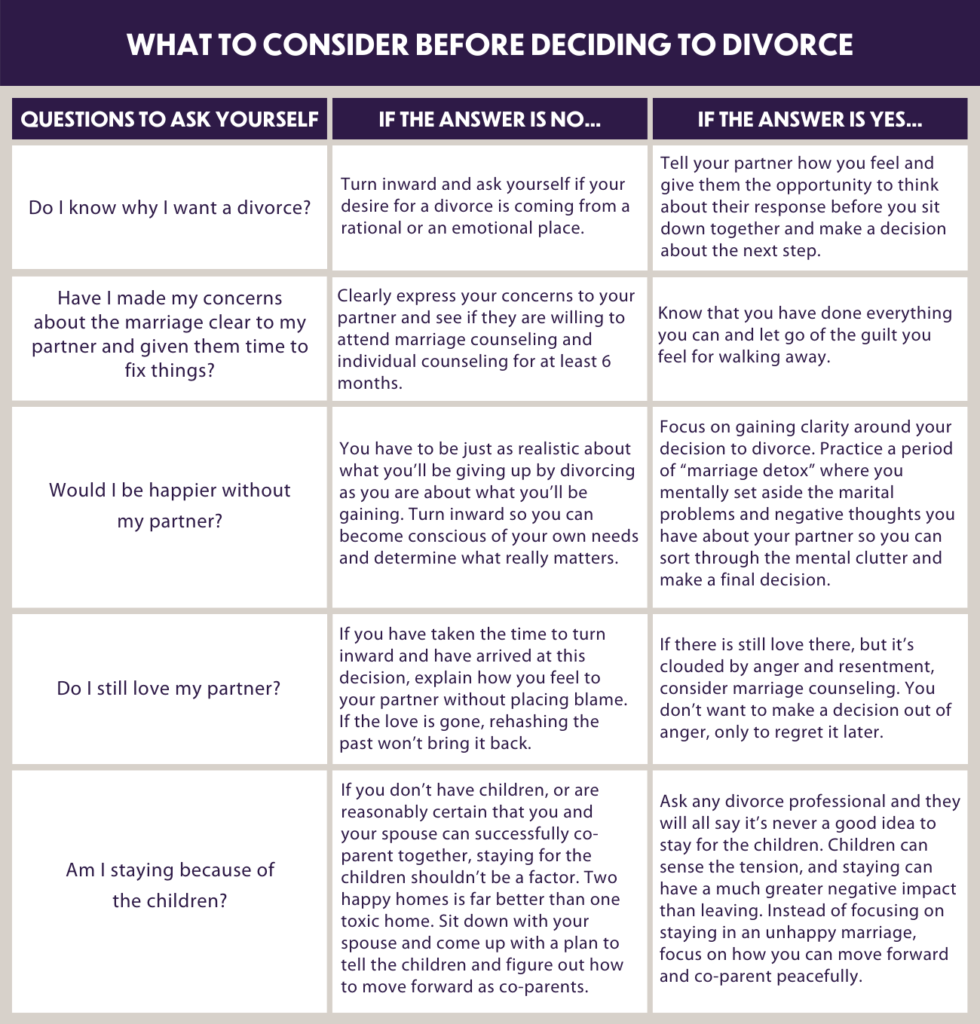Are you experiencing divorce decision paralysis? When you’re in the “to stay or to go” stage of your marriage, you can feel anxious, uncertain, overwhelmed, and even fearful. Forming decisions when you’re in this state can have you making choices you otherwise wouldn’t make. If you want to end the decision paralysis and move forward with confidence, there are a few things to think about first.

The Importance of Focusing Inward
We often focus on the other person when we’re having relationship problems. We think about what they’re doing or not doing, what they’re thinking, and how they’re feeling. This can build up a bubble of resentment that can cloud our judgment and make it difficult to find clarity in our decision. Taking a “marriage detox” for a brief period of time can give you the space and distance you need to sort through the mental clutter and figure out what truly matters to you. It also allows you to stop placing blame so that you can focus on dispelling anger and moving through the divorce process as amicably as possible, should you choose to divorce.
How to Focus Inward
We know that focusing inward is an important part of the decision-making process when you’re in the “to stay or to go” stage of marriage, but how do you do it? A few things you can do:
● Explore your attachment style. This can help you determine why you may be having marital problems and how your behavior is contributing to those problems. It also helps you figure out why you view your partner the way you do so that you can gain clarity in the “to stay or to go” phase.
● Pay attention to your inner experience. Tune in and listen to your thought patterns and the messages your body is sending you. You can practice deep breathing to help with this. Deep breathing calms down the nervous system so that you don’t react on impulse, but instead engage the prefrontal cortex part of your brain that allows you to make the best decision possible.
● Commit to honoring yourself and your healing process. Should you choose to divorce, it’s a long process ahead. You will need to take things one step at a time, and a good way to do that is by making small commitments to yourself, and then following through on them. This helps you build trust in yourself, which is an important thing to have when you’re deciding to divorce. In addition to making small commitments, it’s also crucial to forgive yourself and practice self-compassion. You’ll need those things to heal and move on with your life.
If You Choose to Stay
Divorce is a life-changing decision and not one to be taken lightly. If you choose to give your marriage more time, you’ll both need to commit to putting in the work. This means working on relationship and intimacy skills to try to find your way back to each other. The work will need to go deeper than the physical connection so that you can relate to each other emotionally, intellectually, and spiritually as well. Working with a marriage counselor or coach who specializes in relationships, in conjunction with individual therapy, should be practiced for at least six months if you are really going to be committed to the process. Putting in the work may help change how you relate to each other, or it may not. If things don’t progress the way you need them to, at least you know you’ve tried everything you could, and you can let go of the guilt associated with walking away.
Whether you choose to stay or to go, getting advice about the divorce process and educating yourself is smart. Don’t take the decision or the process lightly and do your due diligence. Think about what you will experience if you decide to divorce, and how your life will change. Be practical and rational about things, and most importantly, know your rights.
If you need more information about the divorce process, check out these other resources.
